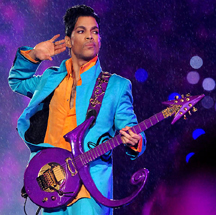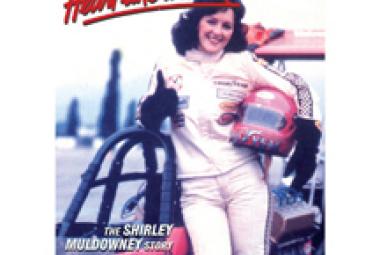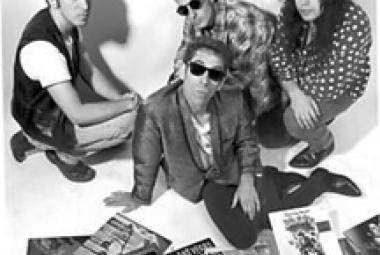PRINCE
Prince (born June 7, 1958) is an American singer-songwriter, multi-instrumentalist, and actor. He has produced ten platinum albums and thirty Top 40 singles during his career. He has written several hundred songs and produces and records his own music for his own music label. He changed his name to an unpronounceable symbol () in 1993; but in 2000, he began referring to himself as “Prince” once again. Prince has a wide vocal range and is known for his flamboyant stage presence and costumes. He has sold over 100 million records worldwide, making him one of the best-selling artists of all time. (More from Wikipedia)
The recent untimely death of the legendary Prince – a former child prodigy simply bursting with talent who has a musical legacy anyone would be proud to call their own – revived the story of the founding of the Parents Music Resource Center (PMRC) that I remember being populated by Senators’ wives, with all of them being Republican save the most prominent member, Tipper Gore, the wife of then-Senator and future Vice President Al Gore. They were concerned about the effects of rock music lyrics on impressionable children, and that led to Senate hearings and notorious “Parental Advisory / Explicit Lyrics” stickers that appeared on many records beginning in the 1980’s. The controversy had the predictable result of both encouraging sales of supposedly offensive music while simultaneously making a lot of albums difficult to find – Walmart for one refused to sell any CD’s with a Parental Advisory sticker.
* * *
But before I get into all of that, let me share this appreciation for Prince that was posted by Nick Gillespie on reason.com as part of the best commentary on the PMRC that I have been able to find online. It is quite a bit more barbed than the mainstream accolades that you and I have been reading of late.
“Prince is dead and we look to see who might replace him and see no one on the horizon. As Brian Doherty so aptly puts it, ‘He was a bold rebel in terms of image and message, playing with still-prevalent social confines of propriety in behavior, dress, and comportment, mixing sex and religion like they were his own personal possessions he was generous enough to share with us, destroying color lines in pop music and its fandom.’
“More than Michael Jackson and arguably even more than Madonna — to name two other ’80s icons who challenged all forms of social convention in a pop-music setting — Prince took us all to a strange new place that was better than the one we came from. (In this, his legacy recalls that of David Bowie.)
“In the wake of the social progress of the past several decades, it’s hard to recapture how threatening the Paisley One once seemed, this gender-bender guy who shredded guitar solos that put Jimi Hendrix or Eric Clapton to shame while prancing around onstage in skivvies and high heels. He was funkier than pre-criminality Rick James and minced around with less shame and self-consciousness than Liberace. Madonna broke sexual taboos by being sluttish, which was no small thing; but as a fey black man who surrounded himself with hotter-than-the-sun lady musicians, [Prince] was simultaneously the embodiment of campy Little Richard and that hoariest of White America boogeymen, the hypersexualized black man.
“No wonder he scared the living s--t out of ultra-squares such as Al [Gore] and Tipper Gore. In 1985, the future vice president and planet-saver and his wife were, as Tipper’s 1987 best-selling anti-rock, anti-Satanism, anti-sex manifesto put it, Raising PG Kids in an X-Rated Society. Tipper headed up the Parents Music Resource Center (PMRC), whose sacred document was a list of songs it called ‘The Filthy Fifteen’. These were songs that glorified sex, drugs, Satan, and masturbation and could pervert your kid — or even lead them to commit suicide. At number one on the list was Prince’s ‘Darling Nikki’, from his massive soundtrack record to Purple Rain (jeezus, wasn’t that movie a revelation? Of what exactly, I can’t remember; but finally, it seemed, a rock star had truly delivered on the genius we all wanted to see emerge from pop music into film).”
* * *
I heard the story I believe on CBS Sunday Morning; my own seething anger at the time about the whole PMRC charade had been blunted somewhat by seeing the tongue-in-cheek 2002 movie that VH1 broadcast called Warning: Parental Advisory. (As an aside, I have no children of my own, and that might have affected how I feel about it all, though I very much doubt it). It seems that little Karenna Gore (11 years old at the time) was a Prince fan, and Mom and Dad bought her the Purple Rain soundtrack album. And then the track “Darling Nikki” came on; in the context of the film, the Prince character was engaging in what might be called “slut-shaming” today:
I knew a girl named Nikki I guess you could say she was a sex fiend I met her in a hotel lobby Masturbating with a magazine
This was also a central story in their best-selling book, appearing on the third page of Raising PG Kids in an X-Rated Society: “The song went on and on, in a similar manner. I couldn’t believe my ears! The vulgar lyrics embarrassed both of us. At first, I was stunned — then I got mad!”
The Nick Gillespie piece continued: “Of course, when you’re the wife of a second-generation U. S. Senator, your mad counts for more than most of the rest of us. In 1985, the Senate wasted its time and our money by holding a hearing on the dread menace of dirty lyrics and the whole bang-the-gong medley of backward masking, rock-induced suicide, and sexual promiscuity. Just a few years later, Al [Gore] and Tipper [Gore] would reinvent themselves as diehard Grateful Dead fans, the better to look hip while campaigning with Bill [Clinton] and Hillary Clinton (another couple of revanchist baby boomers who burned a hell of a lot of time in the 1990’s attacking broadcast TV and basic cable as impossibly violent and desperately in need of regulation).”
* * *
The infamous Filthy Fifteen, along with the reasons for their inclusion on the list, follow. Not only is Prince listed first on the list, he was also the songwriter for #2, “Sugar Walls”; and Vanity, at #4, is a one-time Prince protegé.
2. Sheena Easton – “Sugar Walls” (sex)
3. Judas Priest – “Eat Me Alive” (sex)
* * *
I had intended to go down the list, one by one, since the point of this post is to examine the outrageous and often offensive lyrics that rock music has created over the years, beyond those that I have talked about previously in earlier posts. Frankly, the Filthy Fifteen is under-whelming in this regard and doesn’t deserve that much attention. Most of the rock artists on the list are well known enough, but I am not at all familiar with Mercyful Fate or Venom, the two “occult” offenders. Their music is pretty disgusting all right, and they likely have the PMRC to thank for one-half of their record sales.
Only a third of the songs on this list – “We’re Not Gonna Take It”, “She Bop”, “Sugar Walls”, “Dress You Up”, and “In My House” – were hits, and only the Twisted Sister number is really a signature song. Most of the Filthy Fifteen are deep album cuts that, even at the time, were likely unfamiliar to many of the fans of these bands and artists. For me, the Prince song “Darling Nikki” does not ring a bell; and the same goes for those by Def Leppard, Black Sabbath, Mötley Crüe, Judas Priest, and AC/DC. If this was intended as a resource to help out parents instead of just a publicity stunt, adding the album names would have saved everyone a lot of time.
* * *
Songs about masturbation were fairly common in the 1980’s, and several became hits. (Prince’s “Darling Nikki” was not even released as a single). Examples include “The Stroke” by Billy Squier, “I Touch Myself” by DiVinyls, and “Turning Japanese” by the Vapors – the latter song is a reference to what some people say a face can look like at the moment of climax.
(June 2016)
* * *















